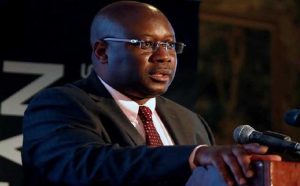

ON the outskirts of Harare, an abandoned mining town emerges and as you draw closer, its pit-riddled fields and several underground tunnels bearing the marks of a previous era, when the huge investment once supported a bustling Zimbabwean community.

Mines Minister Winston Chitando
Nestled between fertile farm lands of Mashonaland Central, Jumbo Mine — previously owned by South African Mzi Khumalo’s Metallon Gold Corporation (Metallon) — represents the transformation of Zimbabwe’s gold mining sector from formal operations to informal.
Two events have underpinned this transformation: first, it was the mass scale collapse of gold mines under the weight of hyperinflation in 2008 then there was the rapid decade-long economic decline, which left hundreds of thousands without jobs, forcing them to try their luck in informal businesses.
Before November 2008, Metallon itself once commanded 40 percent of all gold output produced in Zimbabwe. It is now a pale shadow of its former self. In fact, its mines have either been mothballed by delayed payments of gold delivered to the government, or have been sold.
This has resulted in illegal artisanal miners — like vultures encircling a dying animal — swooping on the disused mines scattered across the country for survival.
Grinding piles of rough stones into gold-flecked silt on a large concrete slab, 29-year-old Mufaro, is one of the ghostly dust-covered miners — known in local parlance as ‘makorokozas’ — who are earning a living from gold mining.
“I have to fend for my family. There is no other way. I know the risks associated with this but I have no choice,” the father of three told this publication.
His daily struggles are not uncommon in the gold mining zone. Many people risk their lives to get the yellow metal, which has courted global attention after prices have rocketed in the past year.
Mufaro says the principal market for the small amount of gold that they harvest comprises unidentified people from the capital who weigh the gold they have and give them an agreed amount of money.

“I can only sell my gold to ‘maboss’ (bosses) who come from Harare because I don’t have the papers to give it to the government. Travelling all the way there with the small grams might mean I can be arrested for illegal possession of gold. Besides, this side you are paid instantly,” Mufaro said with a wry smile on his dirty face.
Although small-scale miners contribute more than half of Zimbabwe’s gold production, the southern African country has not benefited much from gold mining this year as unfavourable prices offered by government and small-scale unfriendly policies force artisanal miners to divert it to the black market, analysts say.
Zimbabwe has over the years earned at least US$1 billion annually on gold exports, despite the Home Affairs ministry insisting the country is losing about US$100 million monthly to smuggling.
This notion is further reinforced by analysts, who believe the country can earn up to US$5 billion per annum from gold — if it eliminates corruption in the mining sector and other illicit activities such as smuggling — which could be used to fix the economy.

Finance Minister Mthuli Ncube
Zimbabwe Miners Federation (ZMF, an association of small-scale miners) chief executive Wellington Takavarasha told The Financial Gazette that illegal miners who invade unused mines are mostly previous employees who know that the resource is available.
“We have more than 30 000 registered small-scale miners across the country and an additional 1,5 million who are not registered. From those numbers you find that 84 percent of gold mined does not reach Fidelity Printers and Refiners (FPR). There is a middleman who buys the gold from the illegal miners,” he said.
FPR is an entity wholly-owned by Zimbabwe’s central bank as custodian of the country’s security and commercial printing, gold refinery and buying and, lately, administering a newly-established Gold Development Initiative Fund.
Takavarasha said the issue of formalisation of small-scale miners must be addressed as a matter of urgency because it gives people mining title and if they get the titles they contribute to the economy.
“The amount of gold traded illicitly is between 900 kg and one tonne in a month. Government has to formalise, recognise and incentivise the illegal miners because illegal mining will remain a concern. It’s a livelihood.
“Government should also remove bottlenecks for miners to register to operate so that the actively engaged get involved in the mainstream economy.”
Finance minister Mthuli Ncube said smuggling remains a concern, at a time the central bank increased retention figures.
“I don’t know how gold is leaving the airports but it leaves, we are told, on some flights. How it leaves, whether scanners go off at an opportune time or not, I don’t know,” he said.
Chamber of Mines of Zimbabwe Gold Producers Association chairman Thomas Gono said that artisanal miners divert the yellow metal to other buyers in the hope of getting full amounts of proceeds.
“Small-scale miners want to be paid promptly and in full amounts. If that doesn’t happen then they find alternatives that are viable for them. The country will continue losing minerals and revenue as long as small-scale miners do not get paid instantly,” he told The Financial Gazette.

Zimbabwe’s gold deliveries in September plunged by 73 percent to 1,36 tonnes from 2,8 tonnes in the comparative period in prior year owing to rampant smuggling by small-scale miners who blamed payment delays being faced by the miners.
The Reserve Bank of Zimbabwe’s foreign currency retention system allows miners to retain 70 percent of their forex earnings. According to the Chamber of Mines, this is not enough for miners to pay for raw materials.
However, suspended ZMF president Henrietta Rushwaya said the government should allow her organisation to operate as a registered gold buyer as a way to curb gold leakages.
“Allow us to help in the gold mobilisation exercise. We have taken it upon ourselves as ZMF that we try to reach all areas that FPR has not been able to reach, and we can collect as little as one point of gold.
“One point collected from as many as 2 000 miners can be of significance to the national fiscus,” she said before her arrest in October.
Editor’s Note: As this story was being prepared for publication, Rushwaya was arrested at Zimbabwe’s Robert Gabriel Mugabe International Airport, on her way to Dubai, for allegedly trying to smuggle 6kg of gold stashed in her hand luggage. The case is before the courts in Harare.
This story was produced by Adelaide Moyo. It was written as part of Wealth of Nations, a media skills development programme run by the Thomson Reuters Foundation. More information at www.wealth-of-nations.org. The content is the sole responsibility of the author and the publisher.